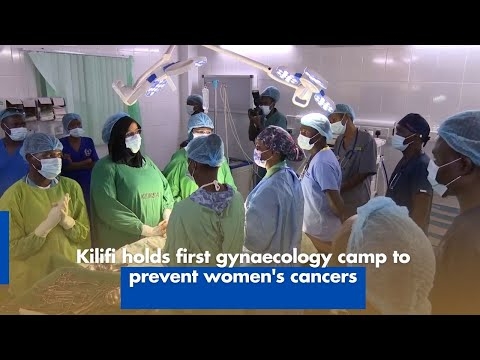

90 per cent of patients being treated for cancer are initially seen by primary health care providers such as clinical officers, medical officers and nurses.
If they knew more about cancer and its
presentation, they would then make quick referrals for further medical
intervention, thereby ensuring that diagnosis and treatment begin early.
Screening and detection require a multifaceted approach among healthcare workers to reduce data disconnection and, ultimately, a decline in the high mortality rates witnessed in recent months.
To ensure that medical workers gain this expertise, the Elewa Cancer Foundation is this week running a training on cancer detection and comprehensive care for healthcare workers from Nyeri County.
The training brings together doctors, nurses,
clinical officers and therapists from Nyeri to develop best practices in
detecting cancer when treating patients.
In opening the week-long training, Dr. Joseph Kiragu, the CECM Health, urged the medical workers to take an individual interest in the cases they are seeing for better outcomes.
“We cannot fight a disease until we employ an individual index of interest and a high level of suspicion while screening patients under our care,” noted Dr. Kiragu.
He urged the practitioners to take on a community approach in the care of patients and ensure early diagnosis as the key outcome.
Dr. Kiragu challenged them not to fear screening patients deemed to be sensitive due to their religion, social standing or age, as it will save them in the end.
A high index of interest entails continuous public engagement with patients, creating awareness and patients’ willingness to participate in preventive measures for various cancers.
The interest is measured by the number of individuals undergoing screening and the demand for such tests as pap smears or mammograms, etc.
Health workers in county medical facilities are best placed to educate their patients and run public health campaigns on the importance of early detection and prevention.
The training, organised in partnership with the Nyeri County Department of
Medical Services and the International Cancer Foundation, will run until Friday, June 13.
The aim is to enhance healthcare providers' capacity in cancer detection and comprehensive care.
This will enable timely diagnosis, appropriate referrals, and efficient patient follow-up.
Dr. Nelson Muriu, Nyeri County’s Director of Medical Services, shared statistics from research he had previously undertaken, which showed that the duration between diagnosis and death for some dire cases was only 90 days.
He pointed out the need to close the gap in data collection and sharing, as patients are seen across different facilities which don’t share medical history.
An average of 20-40 new parents were screened in 2024, with a total of 455 patients being seen in December alone at the various facilities in Nyeri County. 80% of those presented for screening were already at Stage IV cancer, which is already too late.
Breast cancer is the leading type in numbers, with oesophageal cancer coming in a close second. Oesophageal cancer is also the leading type in terms of mortality, as its symptoms are vague, often mimicking other illnesses, which makes it difficult to diagnose unless targeted screening is carried out.
Elewa Foundation’s Dr. Muthoni Musibi noted that the training is taking on a three-pronged approach to equip those trained to train others.
“These health workers will begin here with theoretical training, from where they will continue in their various health facilities. They will thereafter have a technical training in August, which will build on the knowledge here,” she explained.
The desired outcome is to have trainers within the different medical units who
will pass on the knowledge to their peers.
“We want to improve the knowledge of these practitioners as cancer is not taught as a subject in the training curriculum for medical students,” noted Prof. Musibi.
In the spirit of ensuring early cancer screening, the county is benefiting from research carried out by the Global Health Research Group for improving Oesophageal cancer survival in Kenya.
A fully equipped endoscopy Tower truck has been visiting the sub-counties of Othaya Level 4 Hospital, Mukurwe-ini, Karatina and Naro Moru hospitals as well as Mweiga Health Centre, screening residents for oesophageal cancer.
The project is a collaboration between Kenyatta University Teaching, Referral and Research Hospital (KUTRRH), the University of Manchester and the Christie NHS Foundation Trust.

















